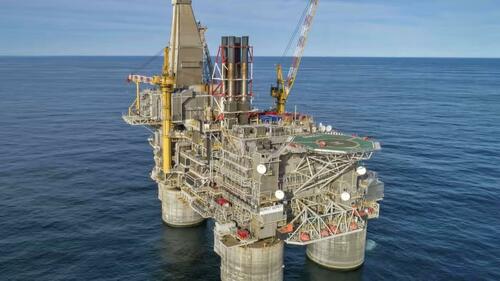
While Europe continues the unvarnished hypocrisy of pretending it is imposing draconian sanctions against Russian oil and gas, when instead it is merely buying the country's natural resources via such middlemen as India and China (an exercise in virtue signaling that costs it a 20% mark-up to Russian prices), less than a year since the start of the Ukraine war, some countries have had enough of pretending.
Today, the Japanese government decided to officially screw the sanctions, and remain involved in the (formerly Exxon-led) Sakhalin-1 oil and gas project in Russia, as it seeks a stable supply of energy (who doesn't) despite international sanctions on Moscow over its invasion of Ukraine, the Nikkei reported.
ExxonMobil, which held a 30% stake in Sakhalin-1, announced in March that it would withdraw from the project. But after vacillating for more than half a year, Japan decided not to follow in Exxon's footsteps.
Meanwhile, Russia set up a new company to take over the project under a presidential decree that has in effect forced investors to choose sides. Japan's Ministry of Economy, Trade and Industry is a stakeholder in Tokyo-based Sakhalin Oil and Gas Development -- which owns 30% of Sakhalin-1's current operator - along with other investors including Itochu, Japan Petroleum Exploration and Marubeni.
The Japanese consortium will make a final decision on whether to stay invested in the project after discussions with other stakeholders.
Why does this matter? Well, back in may, the G-7 nations decided to ban imports of Russian crude oil. Although the G-7 did not decide on a time frame, saying only that the ban will be enforced in a "timely and orderly fashion," Japan's continued participation in Sakhalin-1 would go against the consensus among fellow G-7 members.
In short, Japan would be the first "western" nation to officially breach the anti-Russia alliance.
Of course, there are reason: Japan relies on the Middle East for 95% of its crude imports, and sees ownership in Russian projects as essential to ensuring a stable supply of energy. But then again, one can say the same of most of the developed world, and certainly all of Europe, where Russian energy commodities serve as the basis for comfortable, modern life.
On October 7, Vladimir Putin signed a decree transferring Sakhalin-1 to a newly established company, which was registered on Oct. 14. Stakeholders in the project were given one month to decide whether to invest in the new company, and relevant Japanese agencies, including the Ministry of Economy, Trade and Industry, have been considering their options. They have now decided.
A unit of Russian state oil company Rosneft is expected to operate Sakhalin-1 after ExxonMobil. Rosneft and India's state-owned Oil and Natural Gas Corp. each previously held 20% of the project.
As a result of the chaos, operations at Sakhalin-1 have been virtually shut down, and Japan has imported no oil originating from the project recently, so losing its stake will not have an immediate impact on the country's fuel supply.
Russia has transferred operations of the Sakhalin-2 natural gas project to a new company as well. Japanese investors Mitsui & Co. and Mitsubishi Corp. decided to retain their stakes in the project, and their continued investment has been approved by the Russian government.
Translation: the upcoming G-20 will be rather awkward as Japan's PM Fumio Kushida, an anchor pillar of the G7 in Asia, may decide to sit at the table next the Xi and Putin.
While Europe continues the unvarnished hypocrisy of pretending it is imposing draconian sanctions against Russian oil and gas, when instead it is merely buying the country’s natural resources via such middlemen as India and China (an exercise in virtue signaling that costs it a 20% mark-up to Russian prices), less than a year since the start of the Ukraine war, some countries have had enough of pretending.
Today, the Japanese government decided to officially screw the sanctions, and remain involved in the (formerly Exxon-led) Sakhalin-1 oil and gas project in Russia, as it seeks a stable supply of energy (who doesn’t) despite international sanctions on Moscow over its invasion of Ukraine, the Nikkei reported.
ExxonMobil, which held a 30% stake in Sakhalin-1, announced in March that it would withdraw from the project. But after vacillating for more than half a year, Japan decided not to follow in Exxon’s footsteps.
Meanwhile, Russia set up a new company to take over the project under a presidential decree that has in effect forced investors to choose sides. Japan’s Ministry of Economy, Trade and Industry is a stakeholder in Tokyo-based Sakhalin Oil and Gas Development — which owns 30% of Sakhalin-1’s current operator – along with other investors including Itochu, Japan Petroleum Exploration and Marubeni.
The Japanese consortium will make a final decision on whether to stay invested in the project after discussions with other stakeholders.
Why does this matter? Well, back in may, the G-7 nations decided to ban imports of Russian crude oil. Although the G-7 did not decide on a time frame, saying only that the ban will be enforced in a “timely and orderly fashion,” Japan’s continued participation in Sakhalin-1 would go against the consensus among fellow G-7 members.
In short, Japan would be the first “western” nation to officially breach the anti-Russia alliance.
Of course, there are reason: Japan relies on the Middle East for 95% of its crude imports, and sees ownership in Russian projects as essential to ensuring a stable supply of energy. But then again, one can say the same of most of the developed world, and certainly all of Europe, where Russian energy commodities serve as the basis for comfortable, modern life.
On October 7, Vladimir Putin signed a decree transferring Sakhalin-1 to a newly established company, which was registered on Oct. 14. Stakeholders in the project were given one month to decide whether to invest in the new company, and relevant Japanese agencies, including the Ministry of Economy, Trade and Industry, have been considering their options. They have now decided.
A unit of Russian state oil company Rosneft is expected to operate Sakhalin-1 after ExxonMobil. Rosneft and India’s state-owned Oil and Natural Gas Corp. each previously held 20% of the project.
As a result of the chaos, operations at Sakhalin-1 have been virtually shut down, and Japan has imported no oil originating from the project recently, so losing its stake will not have an immediate impact on the country’s fuel supply.
Russia has transferred operations of the Sakhalin-2 natural gas project to a new company as well. Japanese investors Mitsui & Co. and Mitsubishi Corp. decided to retain their stakes in the project, and their continued investment has been approved by the Russian government.
Translation: the upcoming G-20 will be rather awkward as Japan’s PM Fumio Kushida, an anchor pillar of the G7 in Asia, may decide to sit at the table next the Xi and Putin.







